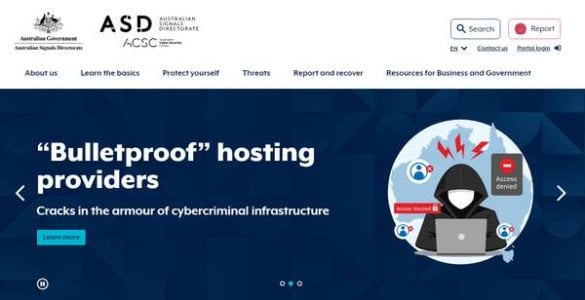Are these government officials calling you? Spot scammers and impostors with this warning!
By
Danielle F.
- Replies 4
As we navigate the digital age, many Australians have already embraced the convenience of technology.
Yet, this convenience could also get overshadowed by the lurking threat of cybercriminals pretending to be trusted authorities.
Sophisticated scammers have been impersonating government officials from the Australian Signals Directorate (ASD) through emails and phone calls to deceive individuals.
The ASD, a cybersecurity intelligence agency, immediately issued a warning about these cybercriminals.
Scammers pretending to be ASD employees have sent out emails masquerading as the Australian Cyber Security Centre (ACSC).
These emails even included vital details such as the ASD's logo and signature blocks to make them appear legitimate.
Since their emails contained vital attachments, scammers could pressure innocent Australians to key in sensitive information such as passwords, personal information and bank details.
Some of the impostors have also coerced victims into purchasing gift cards or cryptocurrency.
These impostors also want victims to act fast—evident as they often create a false sense of urgency.
They would pressure targets to act immediately while threatening dire consequences to the user and their data.
Some scammers would falsely claim that your IP address has been used for illegal activities online, prompting an emergency for victims.
However, the ASD pointed out ways to distinguish genuine ASD communication from fraudulent ones.
The ASD clarified that it will never ask for personal details like passwords or answers to security questions.
ASD also assured Aussies that it would not send emails regarding a user's IP address, nor would it send a link to an antivirus software.
Most importantly, an accurate ASD or ACSC employee will never pressure you to stay on the line.
'A real ASD's ACSC employee will always encourage you to hang up and call 1300 CYBER1 to confirm you are speaking to us,' ASD wrote in a statement.
If you have received a scam email or phone call from ASD, report it immediately.
You may visit the ASD's ReportCyber and follow their on-screen prompts.
Reporting these incidents could protect you and your loved ones from any looming cybercrime.
The SDC Forum also has a Cybersecurity for Aussies Over 60 module available online.

Have you or someone you know encountered a similar scam? Share your experiences in the comments below to help raise awareness within our community.
Yet, this convenience could also get overshadowed by the lurking threat of cybercriminals pretending to be trusted authorities.
Sophisticated scammers have been impersonating government officials from the Australian Signals Directorate (ASD) through emails and phone calls to deceive individuals.
The ASD, a cybersecurity intelligence agency, immediately issued a warning about these cybercriminals.
Scammers pretending to be ASD employees have sent out emails masquerading as the Australian Cyber Security Centre (ACSC).
These emails even included vital details such as the ASD's logo and signature blocks to make them appear legitimate.
Since their emails contained vital attachments, scammers could pressure innocent Australians to key in sensitive information such as passwords, personal information and bank details.
Some of the impostors have also coerced victims into purchasing gift cards or cryptocurrency.
These impostors also want victims to act fast—evident as they often create a false sense of urgency.
They would pressure targets to act immediately while threatening dire consequences to the user and their data.
Some scammers would falsely claim that your IP address has been used for illegal activities online, prompting an emergency for victims.
However, the ASD pointed out ways to distinguish genuine ASD communication from fraudulent ones.
The ASD clarified that it will never ask for personal details like passwords or answers to security questions.
ASD also assured Aussies that it would not send emails regarding a user's IP address, nor would it send a link to an antivirus software.
Most importantly, an accurate ASD or ACSC employee will never pressure you to stay on the line.
'A real ASD's ACSC employee will always encourage you to hang up and call 1300 CYBER1 to confirm you are speaking to us,' ASD wrote in a statement.
If you have received a scam email or phone call from ASD, report it immediately.
You may visit the ASD's ReportCyber and follow their on-screen prompts.
Reporting these incidents could protect you and your loved ones from any looming cybercrime.
The SDC Forum also has a Cybersecurity for Aussies Over 60 module available online.
Key Takeaways
- Scammers have impersonated officials from the Australian Signals Directorate (ASD) for their sophisticated schemes.
- The scammers use ASD's logo and signature blocks in emails and phone calls to trick individuals into handing over personal information.
- The ASD warned the public of these scams and stressed that it will never ask for sensitive personal information, issue threats, or pressure people to act hastily.
- The ASD advised individuals to verify any communication by calling their official number (1300 CYBER1) and to report any scam activities to the ReportCyber website.








